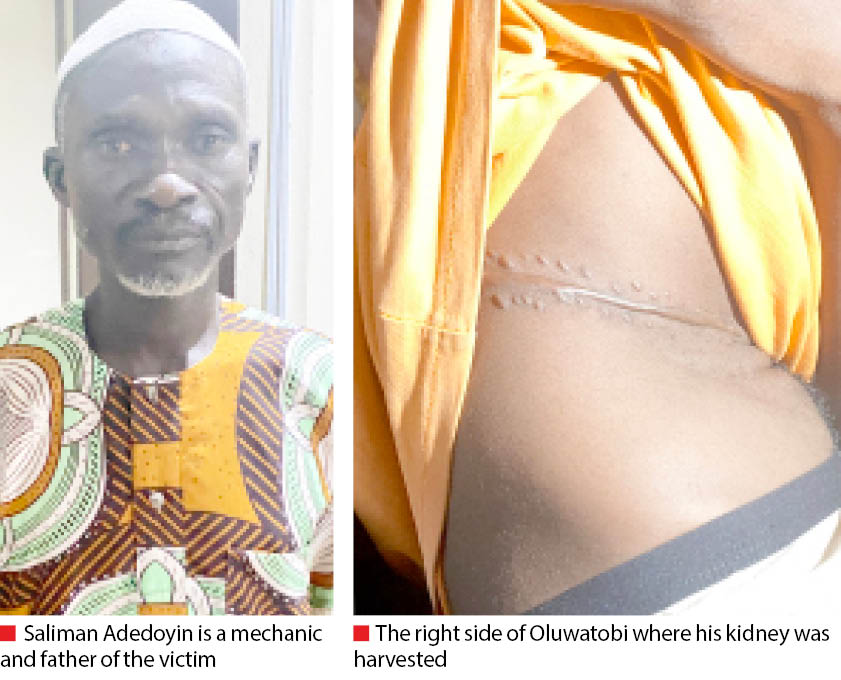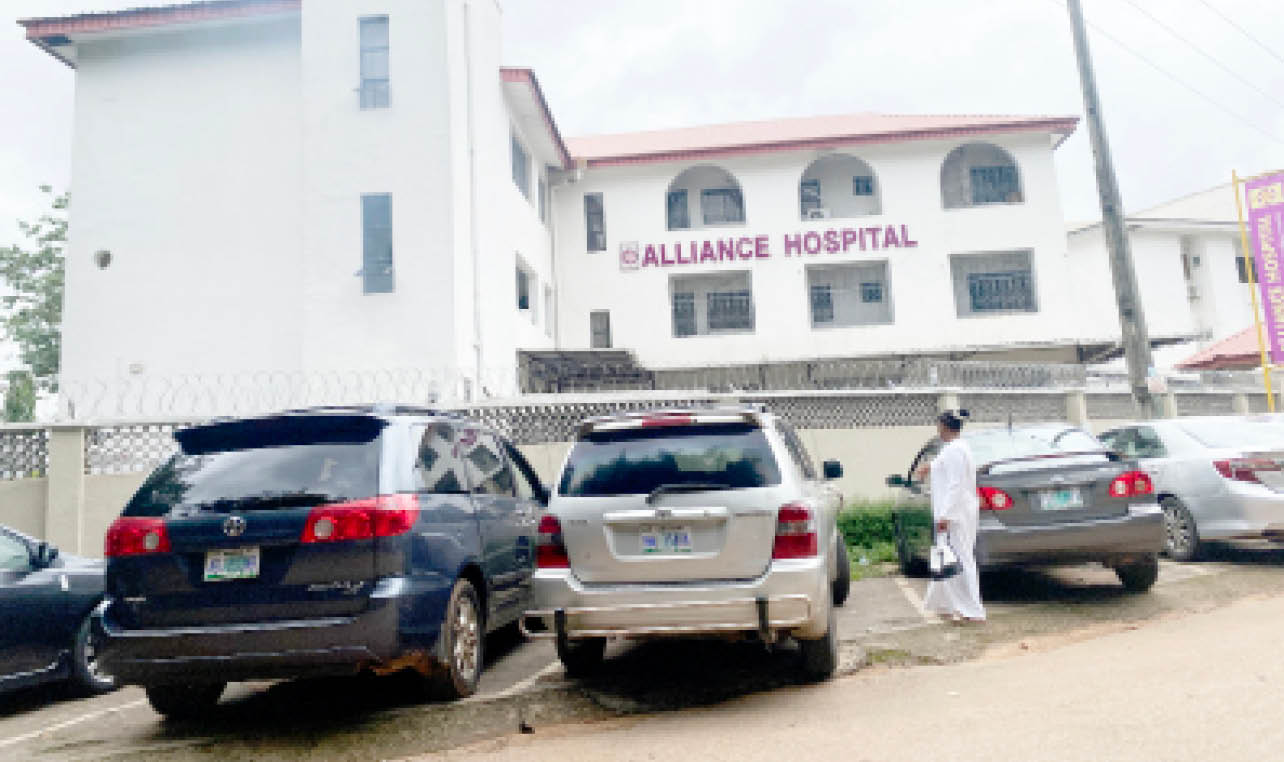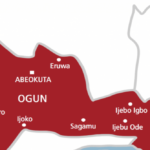Until February 19, 2023, the 16-year-old eldest son of Saliman Adedoyin, a 61-year-old mechanic from Kwara State who lives in Masaka, Karu LGA of Nasarawa State, near the FCT, Oluwatobi Adedoyin, was a boisterous youth. He was eager to write the Unified Tertiary Matriculation Examination (UTME) organised by the Joint Admissions and Matriculation Board (JAMB) to fulfil his dream of studying cartoon editing under theatre arts.
However, everything changed on the day he was scheduled for his biometrics. From visiting the JAMB centre near his home, Oluwatobi was never seen or heard from by his parents. A month later, a family friend called his father to inform him that his son had arrived in Lagos State.
Days of suspicion over why Oluwatobi would run away from home eventually led the probing eyes of his Lagos guardian to a long fresh scar beneath his right rib cage. Put on the spot, Oluwatobi confessed that he was forced to flee home following threats by a syndicate of organ harvesters, who, after taking his right kidney, would go to any length to silence him.
The scar beneath Oluwatobi’s rib cage reminds him of what has been “stolen” from him.
- Organ exploitation: How Abuja syndicate lured minor for kidney harvest
- Qatar to build 500,000 housing units in Kaduna
“He is traumatised; we are all traumatised. I am not sure if it is my son I am seeing. I am seeing him like a picture now; he is not like before. All I want is justice. The government should hold those people who did this to my son. I want my son to be healthy and to go to school,” his father, Adedoyin, said.
As Oluwatobi’s body struggles to adapt to the use of one kidney, he told our reporter that he rarely sleeps at night and is now beginning to understand what happened to him.
He said, “I don’t feel as strong as I used to. I feel numb around the skin where the surgery was conducted.”
The teenager is one of thousands of people across the globe that are lured, exploited and sometimes coerced to sell their organs like kidneys in the black market. Worldwide, organ harvesting syndicates target vulnerable individuals from poor backgrounds such as Oluwatobi.
In a 2021 report, the International Criminal Police Organisation (Interpol) highlighted growing cases of human trafficking for organ removal in North and West Africa. The report showed probable links between transplant tourism, where a patient travels abroad to buy an organ for illegal transplant, and the traffic in human beings for organ removal in North and West Africa. It stated that in most cases the techniques used included promises of job opportunities abroad, as well as threats and violence.
It was the same technique used for Oluwatobi, who was lured by a friend in February, and coerced by a syndicate to pose as a nephew to one Egbuson Sampson, a patient with failed kidneys, at the Abuja-based Alliance Hospital in Area 11, Garki.

How my kidney was harvested – Oluwatobi
Oluwatobi’s predicament started on February 9, 2023, when a friend he referred to as Yellow informed him of a job that would earn him some money. He said he was cajoled into meeting a man who identified himself as Emmanuel Melody and assured him he was a staff of Alliance Hospital in Area 11.
Oluwatobi was persuaded to submit himself for a blood test, which Mr Melody said was needed for the job.
Three days later, Melody reached out to the Oluwatobi through Yellow and requested another meeting.
“It was at that meeting that he told me that they wanted my kidney and I immediately refused. We left, but he called three days later, saying we should come and collect part payment, then we could go back home and think about it. My friend persuaded me and we went there around 4pm,” Oluwatobi explained.
He further said they met Melody at the Alliance Hospital, where he informed them that some procedures had to be carried out before the part payment and handed him (Oluwatobi) to a staff of the hospital, Chikodili Ugochukwu, who took him to court to swear an affidavit.
“Later, another woman took me for an X-ray, and on our way back, we took an Uber, but the car broke down. They said it was too late for me to go home, so that I should sleep in the hospital’s ward. I agreed. Later in the night, they woke me up to sign some documents.”
What Oluwatobi signed was a consent form to go into surgery for his kidney. The form, which was made available to our reporter, states that he was “aware of the intended benefits, possible risks and complications and alternatives to the procedure.” The form had already been signed by one Dr Aremu Abayomi Adeniran who was to perform the procedure.
Checks by Daily Trust Saturday showed that Dr Adeniran is a consultant urologist and the Deputy Director, Clinical Service, at the Alliance Hospital. Miss Chikodili Ugochukwu, who took Oluwatobi to swear the affidavit, is the senior operations manager in the hospital.
But Oluwatobi said he signed the consent form without prior counselling or psychosocial assessment from the hospital, an important requirement in organ donation, according to global best practices. He was also not advised on the risks and implications of the surgery nor the finances for the lifelong care required for kidney donors.
“They said there was no time and that I should hurry and sign the form, so I did. Mr Melody had shown us dollars and they gave me the impression that my friend Yellow was in the theatre and we needed to hurry up,” he said.
He explained that he woke up three days after the surgery, and in his delirious state, made an attempt to leave the hospital but was restrained and told he needed to rest.
He said Melody, who he was told was a staff of Alliance Hospital, had offered to buy him a phone and had sent N120,000 to Yellow, but that Yellow later claimed that the phone had been stolen. Melody then promised to buy him another phone while also sponsoring his hotel bills pending when his stitches would be removed.
“When I got discharged from the hospital, Melody insisted that I should not go home but stay in a hotel. We went to a phone shop with my friend and I picked a phone of N290,000, while Melody transferred N500,000 to the shop owner. The shop owner now transferred the balance of N290,000 to my friend’s account,” he further said.
He said he was forced to move to four different hostels following threats by a gang of youths who he suspected were hired by Mr Melody.
“They were monitoring my every movement and they always knew even when I changed a hotel,” he said.
When Mr Melody sent him another N380,000 for his hotel accommodation, he said the gang of criminals accosted him and forced out N170,000 from him.
As soon as his stitches were removed, he said Mr Melody asked him to flee the town or be killed.
Kidney transplant in Nigeria on the rise
Kidney is the world’s most sought-after organ, going by global statistics that an estimated one million people die each year from untreated kidney failure. This is also because most donors are able to survive with one kidney. The bean-shaped organ, which acts like a filter to remove waste and extra fluid from the body, is also said to be the most trafficked human organ. Data from the Global Observatory on Donation and Transplantation show that kidney transplant is on the rise globally.
Daily Trust Saturday reports that at least 464,314 kidney transplants took place globally between 2018 and 2022, out of which 843 were carried out in Nigeria. Records from the Global Observatory on Donation and Transplantation show that in 2022, Nigeria carried out 222 kidney transplants, most of which, experts said, were carried out by private medical centres that charged above N10m for the surgery.
“How expensive a kidney transplant is depends on where you go for the service. Either in a public institution or in a private centre, most of the private centres charge between N10m and N15m, while at public centres like the Aminu Kano Teaching Hospital (AKTH), Kano, one can get it with less than N5m,” a consultant nephrologist and head of the Nephrology Unit at AKTH, Professor Aliyu Abdu, explained.
Professor Abdu said that going by most studies in Nigeria, the prevalence of Chronic Kidney Disease (CKD) was around 10 per cent. “This means that more than 20m Nigerians have one stage of CKD or another.
“Let us also assume that only five per cent of all those with different stages of the disease have stage five, the stage of CKD at which kidney transplant may be required. We will be talking of around one million Nigerians needing one form of kidney replacement therapy or another, including kidney transplant,” the kidney expert said.
Prof Aliyu said that to check unethical conduct in the harvest and implementation of organs, there were international best practices, as well as guidelines issued by international organisations, which transplant centres in Nigeria must comply with.

“There should be a multidisciplinary transplant committee that should include lawyers, psychologists, social workers, among others, in each centre offering organ transplant.
“This committee should be responsible for the final recommendations to carry out the transplant or not on a case-by-case basis after reviewing all the clinical and other relevant information presented in each case,” he said.
Daily Trust Saturday further reports that trafficking in persons for the removal of organs has become a thriving business due to severe shortage of legally-sourced organs around the world. According to a 2017 report by the Global Financial Integrity, illegal organ trade conservatively generates approximately $84m to $1.7bn annually. Interpol in 2021 suggested that a wide spectrum of actors involved in human trafficking for organ removal had connections to the medical sector in countries from Africa.
With Oluwatobi’s case coming to light shortly after the conviction of Nigeria’s former Deputy Senate President, Ike Ekweremadu, his wife, Beatrice, and a medical doctor, Obinna Obeta, for organ trafficking, experts say the Nigerian government needs to provide a regulatory agency or department in the appropriate ministry to ensure that transplant centres operate based on ethical practices and in compliance with the laws of the land.
Similarities with Ekweremadu’s case
In March, 2023, Ekweremadu, his wife and Dr Obeta were convicted for organ trafficking by the Central Criminal Court in London. The trio faced multiple jail sentences for flying a 21-year-old Nigerian to the UK in the bid to obtain his kidney on behalf of Ekweremadu’s sick daughter, Sonia.
The following month, Ekweremadu was sentenced to nine years and eight months in prison. His wife was sentenced to four years and six months, while Dr Obeta was sentenced to 10 years after the judge heard that the potential donor was young and poor.
Like the Ekweremadu victim, Oluwatobi is vulnerable because of his poor economic background. He was equally tricked into saying he was a relative of one Egbuson Sampson, a patient at the Alliance Hospital with failed kidneys.
Investigation by Daily Trust Saturday revealed that to justify that he was related to Sampson, Oluwatobi was equally persuaded to falsify his age to read 18 years. He signed an affidavit obtained at the High Court of Justice, Wuse, Abuja, which stated that he was 18 years, a nephew to Egbuson Sampson and agreed to donate a kidney to the recipient for a transplant at the Alliance Hospital. He also swore to the fact that the donation was on free will.
The affidavit, as well as a consent form for which the surgery was carried out, is the hallmark of the hospital’s defence and why its Medical Director, Dr Christopher Otabor, said absolved it from any wrongdoing.
“He went to the high court to swear an affidavit. In that affidavit, he stated that he was 18 years old. He was 18 in September before the surgery. He also stated that he was related to the patient and that he was not under any duress and there was no financial consideration in him donating the kidney.
“So, having received the affidavit, and he signed a consent decree, we went ahead and did the surgery,” Dr Otabor said, absolving his hospital of any wrongdoing.
However, Daily Trust Saturday gathered that the Alliance Hospital made provision for the court affidavit Oluwatobi signed and a staff of the hospital transported him to the court to obtain it.
Oluwatobi clarified that Miss Chikodili Ugochukwu, the hospital’s senior operations manager, drove him to the court where he used a light pen to append his signature.
“I was only asked to use a light pen to make a signature, and I did. I was not given a paper to sign, so I did not read any paper,” he said, adding that the other document he signed was the four-page consent form, which showed that he appended his signature on February 17, 2023, at 11:49pm, while Emmanuel Melody signed as a witness at 11:51pm.
Legal breaches
Currently, Nigeria has no regulatory agency guiding organ harvesting and transplant, which gives room for each transplant centre to come up with its own regulations and guidelines. As a result, many centres look the other way even when kidneys are sourced illegally.
For the Alliance Hospital, Dr Otabor said that as a rule the facility did not source donors for patients as they brought theirs.
“In this particular case (Oluwatobi), the patient that received his organ introduced him to the hospital as his donor. As our tradition is, we did the initial preliminaries and he was fit to donate,” he explained.
But Oluwatobi is underage, and by law is not expected to make such life-changing decisions without the supervision of his parents.
Section 48(2) of the National Health Act 2014 states that a person shall not remove tissue, which is not replaceable by natural processes, from a person younger than 18 years. Section 20 (3) of Nigeria’s Trafficking in Persons (Prohibition) Enforcement and Administrative Act 2015 also criminalises enlisting, transporting, delivering and accommodating a person under the age of 18 for the purpose of removing the person’s organs. It states that such a person is liable on conviction to imprisonment for a term of not less than seven years and a fine of not less than N5m.
Oluwatobi’s certificate of birth printed by the National Population Commission (NPC) and registered on October 17, 2006, shows that he was born on September 3, 2006. The certificate was registered at the Primary Health Centre (PHC), Masaka, Karu LGA of Nasarawa State.
Speaking on the issue, a constitutional lawyer, Tope Idris Lawal, said Alliance Hospital could not absolve itself from blame as a court affidavit was a secondary document to be used where there was no availability of a primary document.
“In a situation where we have a primary certificate, which is a birth certificate, it stands taller than an affidavit,” he explained.
In his analysis of Oluwatobi’s situation, Lawal said hospitals must take the principle of due diligence seriously, noting that where there was no birth certificate, the management of Alliance Hospital should have demanded a declaration of age, as, “Anything short of that makes Alliance Hospital liable.”
On the connection of Mr Melody to Alliance Hospital, Dr Otabor said the suspect was not a staff of his hospital and could at best be described as a tout suspected to hang around hospitals.
“To start with, I don’t know anybody like that, and we don’t have anybody like that in Alliance Hospital. There are touts who hang around and present themselves as maybe representing the hospital. So, it is possible. I don’t know that the donor, the recipient, got in touch with them and I don’t know how they got him,” he said.
Both Mr Melody and Yellow are now on the run. A name search on Truecaller showed that Mr Melody’s name is saved as Mr Mayor. Several efforts to reach them on phone proved abortive as their numbers were switched off.
Police launch investigation
Daily Trust Saturday reports that the FCT Police Command launched an investigation into the circumstances that led to the harvest of Oluwatobi’s kidney. The investigation led to the arrest of Dr Adeniran who conducted the surgery on the minor.
However, our correspondent gathered that the urologist has been released on bail.
The Medical Director of Alliance Hospital, Dr Otabor, confirmed that Dr Adeniran was detained by the police but released on bail.
He said the police tried to get in touch with Egbuson Sampson, the recipient of Oluwatobi’s kidney, but found that the patient died four months after the surgery.
The FCT police spokesperson, SP Josephine Adeh, confirmed that the doctor in the middle of the scandal had been released on bail while the matter was still being investigated.
“The case is under investigation at our state Criminal Investigation Department (CID). The doctor was arrested but released on bail. The investigation is yet to be concluded. You don’t give an investigation timeline because time is needed to properly investigate such a sensitive issue. We assure you that justice will be served and we will brief the public on the outcome,” she said.
Daily Trust Saturday reports that at least 464,314 kidney transplants took place globally between 2018 and 2022, out of which 843 were carried out in Nigeria. Records from the Global Observatory on Donation and Transplantation show that in 2022, Nigeria carried out 222 kidney transplants, most of which, experts said, were carried out by private medical centres that charged above N10m for the surgery.
“How expensive a kidney transplant is depends on where you go for the service. Either in a public institution or in a private centre, most of the private centres charge between N10m and N15m, while at public centres like the Aminu Kano Teaching Hospital (AKTH), Kano, one can get it with less than N5m,” a consultant nephrologist and head of the Nephrology Unit at AKTH, Professor Aliyu Abdu, explained.
Professor Abdu said that going by most studies in Nigeria, the prevalence of Chronic Kidney Disease (CKD) was around 10 per cent. “This means that more than 20m Nigerians have one stage of CKD or another.
“Let us also assume that only five per cent of all those with different stages of the disease have stage five, the stage of CKD at which kidney transplant may be required. We will be talking of around one million Nigerians needing one form of kidney replacement therapy or another, including kidney transplant,” the kidney expert said.
Prof Aliyu said that to check unethical conduct in the harvest and implementation of organs, there were international best practices, as well as guidelines issued by international organisations, which transplant centres in Nigeria must comply with.
“There should be a multidisciplinary transplant committee that should include lawyers, psychologists, social workers, among others, in each centre offering organ transplant.
“This committee should be responsible for the final recommendations to carry out the transplant or not on a case-by-case basis after reviewing all the clinical and other relevant information presented in each case,” he said.
Daily Trust Saturday further reports that trafficking in persons for the removal of organs has become a thriving business due to severe shortage of legally-sourced organs around the world. According to a 2017 report by the Global Financial Integrity, illegal organ trade conservatively generates approximately $84m to $1.7bn annually. Interpol in 2021 suggested that a wide spectrum of actors involved in human trafficking for organ removal had connections to the medical sector in countries from Africa.
With Oluwatobi’s case coming to light shortly after the conviction of Nigeria’s former Deputy Senate President, Ike Ekweremadu, his wife, Beatrice, and a medical doctor, Obinna Obeta, for organ trafficking, experts say the Nigerian government needs to provide a regulatory agency or department in the appropriate ministry to ensure that transplant centres operate based on ethical practices and in compliance with the laws of the land.



